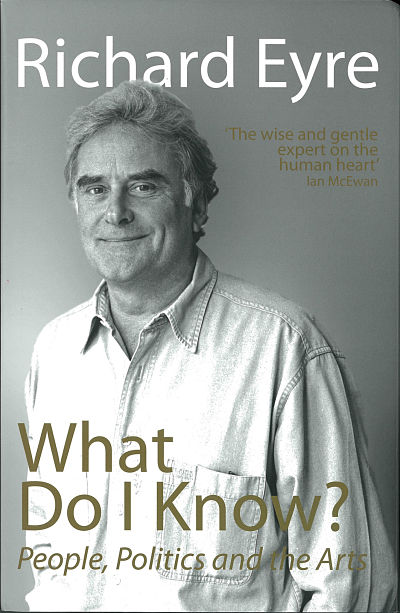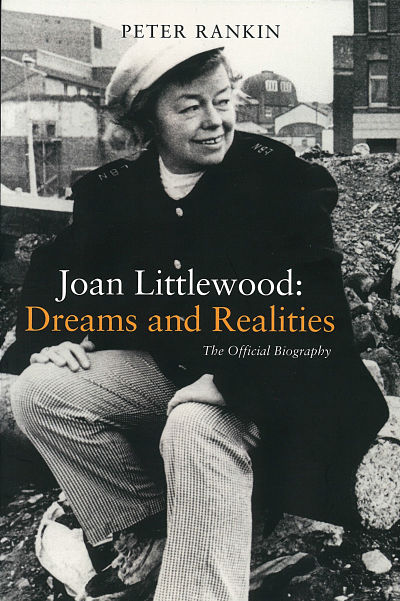Rare, it increasingly seems, is the major British theatre director who doesn’t double as a writer. Peter Hall has multiple self-penned volumes to his name, while Peter Brook’s The Empty Space remains arguably the seminal book examining what it means to engage with theatre in the first place. Michael Blakemore ruffled feathers with his snarky backwards glance at the early days of the National Theatre in the punningly titled Stage Blood, and Kenneth Branagh (a director, of course, as well as an actor) was not yet 30 when his autobiography Beginning was published in 1989.

Still, even by his colleagues’ voraciously literary-minded standards, Richard Eyre’s What Do I Know? People, Politics and the Arts is a breed apart—both for the sustained excellence of the writing and as a testament to a culture that cares enough about directors to give them the various platforms to explain how this motley array of pieces first came to be.
Definably English in both its subject matter and its voice, Eyre’s gathering of articles, diary entries, lectures, and the like culled from across the years gives us a roll call of greats from the world of the British arts—Hall himself as well as Judi Dench, Alan Bennett, and Michael Bryant, the last of whom was an indispensable mainstay at the National Theatre, the institution that Sir Richard ran for nine hugely productive years from 1988 to 1997. (To this day, I remember the gala farewell in Eyre’s honor, which was intensified by a feeling that the building wouldn’t ever be quite so buoyant again—a fear that turned out, thank heavens, to be groundless.)
Just as striking is the tone of Eyre’s discourse, which manages to be gently observant and neatly self-deprecating, as one might expect from a self-described “poor student” who can nonetheless invoke Goya as readily as he cites Montaigne, with a breadth of reference extending to W.H. Auden, John Ruskin, and Iris Murdoch, the novelist who was the subject of Eyre’s fine 2001 film, Iris, for which Jim Broadbent won an Academy Award; Dench, a touchstone across Eyre’s storied career, played the title role. Devotees of the British press may no doubt have come across many of the book’s contents in an earlier sitting; such is the spectrum of journalism available in London that Eyre has been able over time to write for Vogue, the Guardian, the Telegraph, and even the Daily Mail, that last title representing the kind of fear-mongering right-of-center U.K. tabloid that presumably doesn’t get delivered daily to the Eyre household. On the other hand, the piece in question—a memorial to his mother as she surrendered to Alzheimer’s—possesses an unsentimental clarity that strikes the necessarily exacting tone:
She breathed and ate and wasted away. I can still see her hand, bony like a claw, plucking at her face, as if she was surprised that it was still there.
Having directed the first musical (Guys and Dolls) ever seen at the National, Eyre returned to his landmark 1982 production in 1996, a revival of a revival that I had the pleasure of tracking for journalistic purposes at the time. This Cambridge graduate finds himself movingly in thrall to his American brethren, as well: Marlon Brando, Tennessee Williams, and Arthur Miller all get an exegetical going-over in these pages; the Williams entry is in no way surprising to those of us who recall Eyre’s wounding National Theatre production of The Night of the Iguana in 1992, which featured in Alfred Molina’s Shannon and Eileen Atkins’s Hannah one of the great double acts in my experience. I was considerably less persuaded by Eyre’s miscast and charmless West End revival just last year of The Pajama Game, but that’s in no way to discredit the director’s thoughtful program essay for the same production, reprinted in the book.
As one might expect from the writer and presenter of the BBC series “Changing Stages,” a six-part chronicle of theatre history that was aired in the U.S. on PBS, Eyre casts a commendably wide net, his enthusiasms extending toward David Hare—their collaboration on the play Racing Demon remains the only National Theatre production I saw four times during its South Bank run—as well as Tony Kushner, Harold Pinter, and the legendary Luise Rainer. The petite Rainer, a double Oscar winner back when the Academy was in its infancy, was 89 when Eyre visited the one-time star of The Great Ziegfeld at her Belgravia flat in 1999, and the director lets speak for itself his interviewee’s passing firsthand assessment of Albert Einstein: “[He] was a very nice man.” How many conversations, on or off the record, have that kind of reach?
Politics surface, as per the book’s subtitle, in an impassioned defense of government subsidy, that particular piece written for the Financial Times in response to an attack on arts funding that had been mounted by an unnamed American—oh dear!—journalist. Among the more quietly touching pieces is Eyre’s commemorative account of Mary Soames, Churchill’s youngest child, who chaired the National board during most of Eyre’s tenure there and who emerges as a keen-witted and charming friend and ally, not least in the willingness with which she gave herself up to the brave new world of the theatre over which she suddenly found herself casting a necessarily watchful eye.
A portmanteau volume, What Do I Know? finds a reader keen to reply to the question posed by the title: “Gosh, an awful lot.” So what if a quotation from Anna Karenina is allowed to do double duty, or, in an uncharacteristic typo, Hamm from Beckett’s Endgame is missing the second “m”? You’d have to go some way to find as comparably acute a dissection of The Caretaker (an early influence on the fledgling playgoer that was Eyre) on the one hand, Hamlet and King Lear on the other. This collection of apercus leaves one admiring not just an ever-alert and deeply humane director but also a magpie mind. In another iteration of this same life, one can even imagine Eyre having made—heaven forfend—a distinguished critic.

An altogether different sort of theatre director from a previous generation, Joan Littlewood gets mentioned as part of the comprehensive diary that Eyre kept while putting together Changing Stages. “Energetic, knowledgeable, loving” are the three adjectives attributed to Littlewood’s longtime colleague, the actor Howard Goorney, to sum up the life and work of the directorial maverick, who died in 2002 and who was born 100 years ago last year. Now Peter Rankin, in whose actual flat Littlewood expired, has written an exhaustive, faintly exhausting account of Littlewood’s legacy and life. Rankin’s fondness for overwriting aside, Joan Littlewood: Dreams and Realities is essential reading as a reminder of a one-off firebrand whose like hasn’t come our way since, even if Littlewood’s contrariness and obstinacy leap off the page scarcely less vividly than the self-evident passion she brought to her peppery, populist art.
Rankin was 16 when he first saw Oh, What a Lovely War!, the World War I–themed musical whose 1969 film rendition by Richard Attenborough only partly captures the multiple provocations of a piece whose raillery came soaked in acid. At a time when women directors were unheard of on Broadway, Littlewood was twice nominated for a Tony: for the Broadway iteration of Lovely War and for Brendan Behan’s The Hostage in 1960, four years earlier.
Littlewood directed the musical’s premiere for her London-based Theatre Workshop, only to respond to her burgeoning British fame by displacing herself eventually to Paris, the great ocean liners of the English theatre—that is to say, the National and the Royal Shakespeare Company—being ill-suited to her scrappy, sparky approach. Instead, whether at her theatrical home in Stratford, in East London, or abroad, Littlewood followed her own plain-speaking star, ranging from career-defining successes like Shelagh Delaney’s A Taste of Honey to legendary flops like the Lionel Bart musical Twang. Littlewood had infamously passed on directing Bart’s box-office bonanza Oliver!, which she dismissed drily as “all those children running round the theatre.”
Rankin’s elaborately detailed biography (must the minutiae of every decades-old conversation live on anew?) makes one wonder what Littlewood would have to say, for instance, about the cultural politics of the present day, whereby Disney, of all entities, is reported to be planning its first-ever collaboration with the National—a meeting of minds, and monoliths, at some remove from Littlewood’s sense of a theatre created on-the-hoof and crafted by the people, very much for the people. On the other hand, there’s something rather sweet about the way in which her de facto manifesto lives on not only via this book but across the English theatrical landscape at large. Littlewood used to speak, for instance, of a “laboratory of fun” that would take the arts and sciences to the streets. One thinks of the festival of free theatre that seems to have become a fixture at south London’s Scoop every August, and even of the politics of inclusion—700 groundlings paying £5 each—that have underpinned the ongoing appeal of Shakespeare’s Globe. It might even be said that Emma Rice, the Kneehigh director soon to be taking over the top job at the Globe, has about her a Littlewood-esque exuberance.
Still, it’s hard to imagine Littlewood herself taking that job. Cultural citadels weren’t the place for this lively and much-lamented lady, whose governing spirit approached the theatre by making an exuberant invitation—as Rankin reminds us—out of the single word “play.”
Matt Wolf is London theatre critic of the International New York Times.


